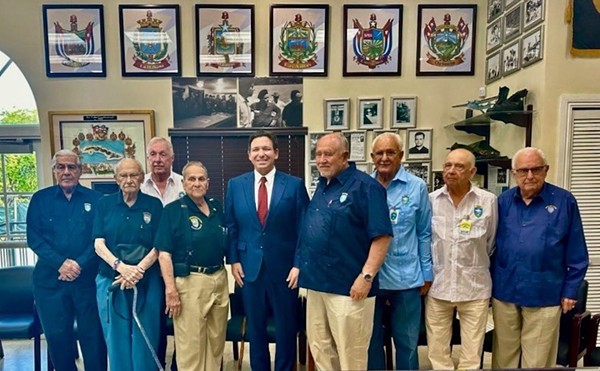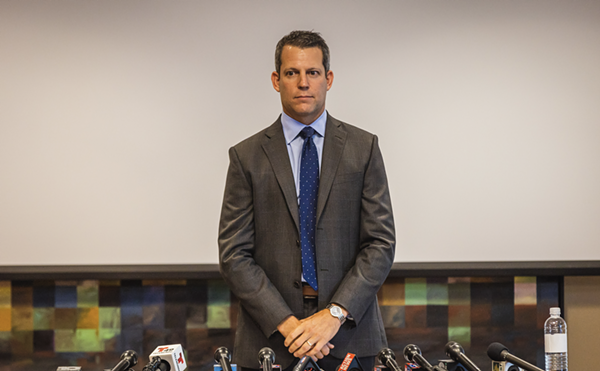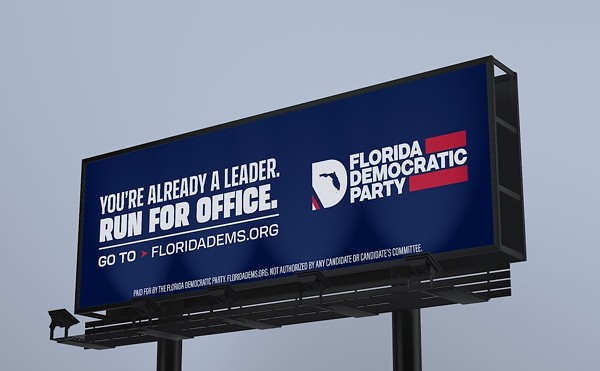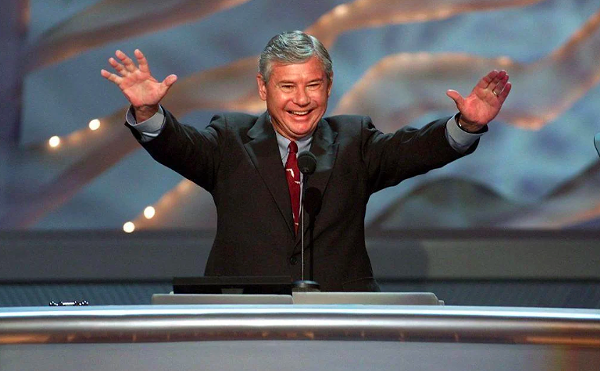Lowman vs. Camp (1997):
The Old Switcheroo
The committee seems to like to defer to government whenever it can.
That's what happened in 1997 when Gulfport mayoral challenger David L. Lowman accused Gulfport City Councilwoman Colleen W. Camp of pulling up one of his yard signs and replacing it with one for Mayor Michael J. Yakes.
Lowman took on Yakes after griping for years that Gulfport police targeted a bar he owned for increased surveillance because it catered mostly to gays.
Gulfport police wouldn't investigate Lowman's complaint against Camp. One of his eyewitnesses got cold feet. Camp said she had permission from the property owner to switch the Lowman sign for the Yakes one.
"In my life, I have never seen dirtier, smearier, gossipier politics than Gulfport city elections," ex-Pinellas Democratic Chairman Paul Hornsleth told the Times around the time that Lowman reported Camp to the fair campaign committee and a host of government authorities.
Despite that tempting invitation, the committee declined to take up Lowman's cause.
Ellis vs. G. Bilirakis (1998):
The Imposter Complex
By far, the strangest complaint in committee annals was filed four years ago by Democratic state House candidate Diane Ellis.
The self-employed legal aide asserted that her opponent, identified on the election ballot as future state Rep. Gus M. Bilirakis, (R-Palm Harbor), was actually an imposter. The real Bilirakis died in 1995, Ellis insisted.
Rounding out her story, Ellis said U.S. Rep. Mike Bilirakis, R-Tarpon Springs, had hired a New Yorker named Danny Divito to pose as his son Gus for the 1998 election.
If true, the allegation would certainly have violated the committee's fair-campaign code. All Ellis lacked was a shred of evidence to support her claim.
Nevertheless, the Ellis complaint won national publicity for the committee, including a Sunday blurb in The New York Times headlined: "Dead Man Running."
"Clearly, in terms of media coverage, that's the biggest thing," Paulson said of the journalistic attention accorded the committee over the years. 'Not because it was the most important but because it was the weirdest, which probably says something about media coverage."
Harris vs. McKeon (1998):
Sticks and Stones
Democrats at a Suncoast Tiger Bay Club forum in October 1998 swore they heard Republican Thomas McKeon call Calvin Harris a liar and a thief.
Harris was one of them. The Pinellas commissioner, who eventually turned back McKeon's challenge at the polls that year, called on the fair campaign committee to punish his GOP opponent for "unfair, reckless, unsubstantiated and slanderous remarks."
The committee did just that, by an 8-to-1 vote. The dissenter was Paulson, who happens to be a registered Republican.
The committee does much good, said Paulson, but it can also chill legitimate free speech in a spirited election fight. He said he believes that's what occurred with the Harris decision.
"It was a stupid thing for the candidate to do," said Paulson, who credits the rhetorical jabs by McKeon, a retired Philadelphia cop, with ensuring victory for Harris, the first black elected to countywide office in Pinellas. "But I thought the candidate had every right to say what he said, however foolish it may have been."
Paulson also had doubts about whether McKeon's more elliptical comments — such as "I don't believe that liars have any business in government" — could be considered to have been aimed at Harris.
Candidates who don't sign the fair-campaign pledge often defend their decision in terms of wanting to protect their right to engage in a robust election debate, according to Paulson.
Paulson, who teaches a USF-St. Petersburg class on campaigning, says technique keeps a skilled candidate on the committee's good side.
"You can tell your audiences that your opponent's plan just makes no sense. It's an abomination," said Paulson. "Just don't, you don't need to call your opponent a stupid idiot. If your opponent is a stupid idiot, the voters don't need to be told that. They can draw their own conclusions."
Failed Coup Attempt (2001)
Paulson more or less followed his own advice while discussing committee co-founder Ray Aden's efforts to get rid of him.
While vacationing in Minnesota last summer, Paulson took a telephone call from the St. Petersburg Times. A reporter wanted to know about a letter from Aden announcing Paulson's departure as chairman of the Citizens for Fair Campaign Practices committee.
Paulson got back to Florida and found that Aden's letter had gotten around to committee members. "They believed, in fact, that I had communicated with Ray or Ray led them to believe that I had communicated that I wanted him to take over this responsibility," said Paulson. "I quickly indicated to them that I never had given Ray that authority."

















